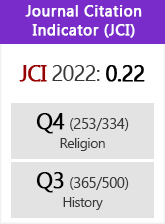Early development of the tradition of the self-confesed adulterer in Islam. An Isnād and Matn analysis
DOI:
https://doi.org/10.3989/alqantara.2010.v31.i2.236Keywords:
ḥadīth authenticity, Isnād criticcism, Matn criticism, Common link, Zinā, Rajm, Adultery, Fornication, Stoning, Self confession, FiqhAbstract
This article applies isnād and matn criticism to traditions relating to the punishment of the self-confessed adulterer in Islam. Above all, it attempts to trace the relevant traditions to their earliest source, who, in the autthor’s view, is Ibn Shihāb al-Zuhrī. The article goes on to discuss the possible contents of this original source, which was apparentlly void of references to the personal name of the adulterer and provisions for his sanity and iḥṣān. The role of ‘Abd al-Razzāq al-Ṣan‘ānī in the elaboration of the matn comes under scrutiny. Later regional and personal variants of the original ḥadīṯ are analyzed in some detail. In its concluding section the article studies the provision for a fourfold confession by the adulterer. The author cites sources attesting to a controversy between ‘Abd al-Razzāq and Abū Dāwūd al-Ṭayālisī concerning the number of confessions needeed for the infliction of rajm.
Downloads
Download data is not yet available.
Downloads
Published
2010-12-30
How to Cite
Pavlovitch, P. (2010). Early development of the tradition of the self-confesed adulterer in Islam. An Isnād and Matn analysis. Al-Qanṭara, 31(2), 371–410. https://doi.org/10.3989/alqantara.2010.v31.i2.236
Issue
Section
Articles
License
Copyright (c) 2010 Consejo Superior de Investigaciones Científicas (CSIC)

This work is licensed under a Creative Commons Attribution 4.0 International License.
© CSIC. Manuscripts published in both the printed and online versions of this Journal are the property of Consejo Superior de Investigaciones Científicas, and quoting this source is a requirement for any partial or full reproduction.All contents of this electronic edition, except where otherwise noted, are distributed under a “Creative Commons Attribution 4.0 International” (CC BY 4.0) License. You may read here the basic information and the legal text of the license. The indication of the CC BY 4.0 License must be expressly stated in this way when necessary.
Self-archiving in repositories, personal webpages or similar, of any version other than the published by the Editor, is not allowed.














